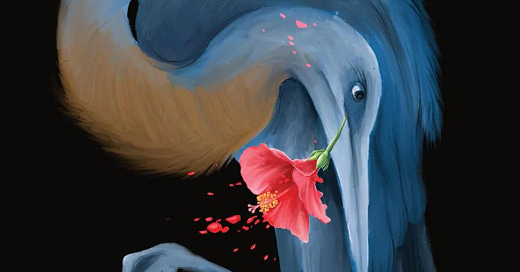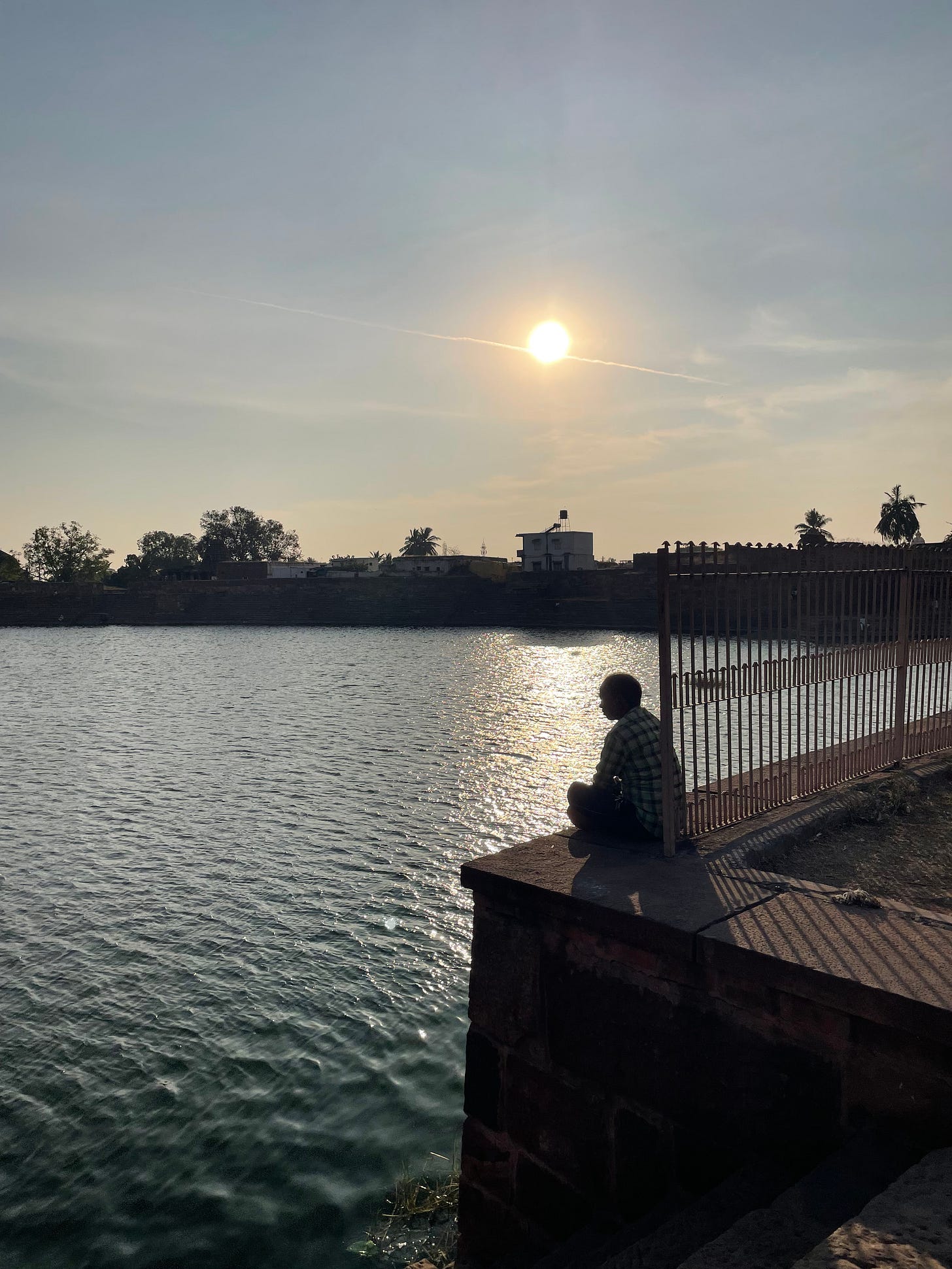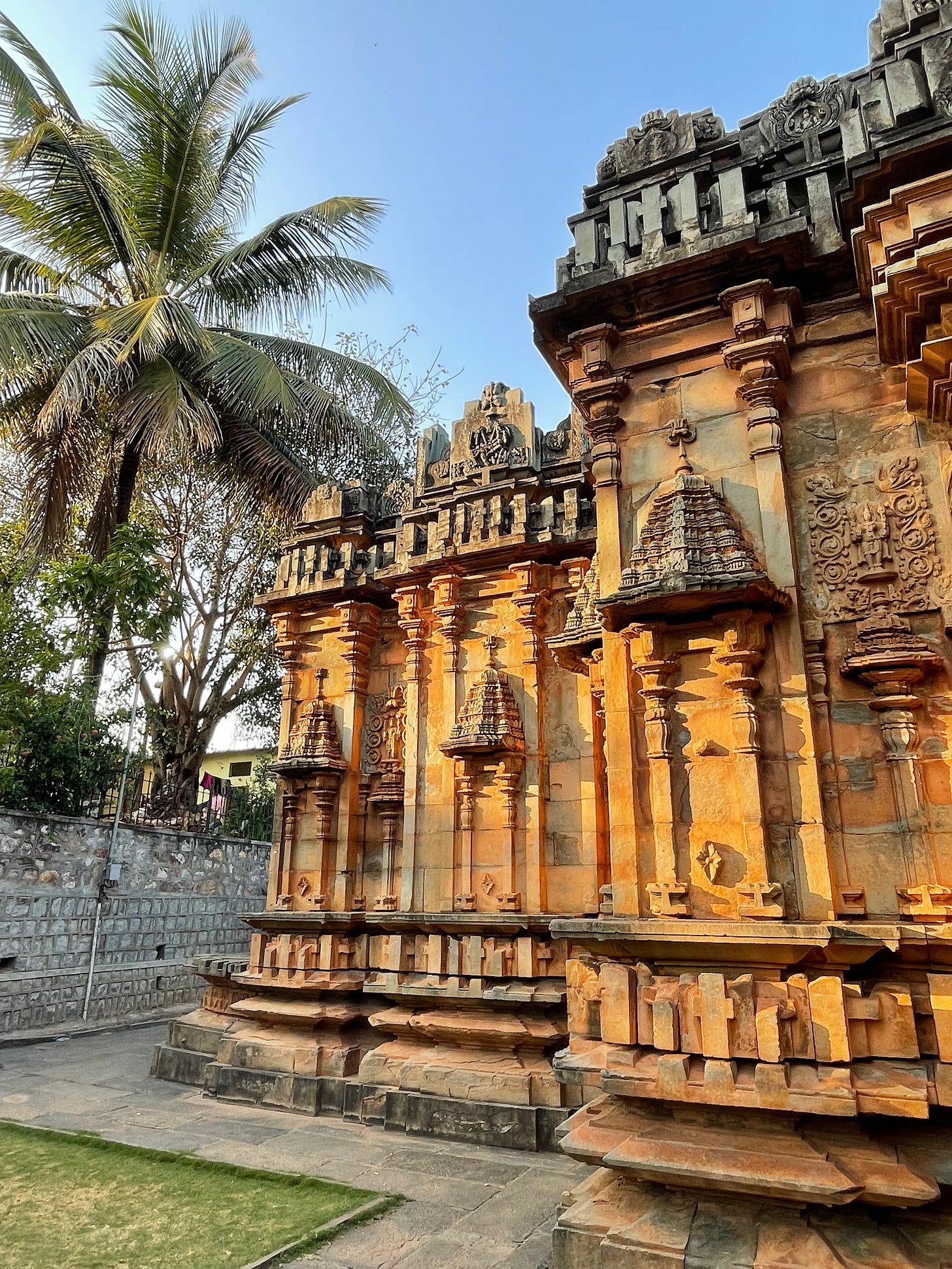A BENGALI BOOK FOR OLD BADAMI
Between traveling and nursing a bad stomach flu, I found it challenging to finish a Bengali novel by Sayam Bandyopadhyay titled Carnival.
All the way from Karnataka’s Hubli airport up north to Badami, we flew past patches of cotton, corn, millet, peanuts and sugar cane. Sunflowers, too, seemed to be big business in these parts and they danced in orderly rows between grains. We were sailing on a satin highway towards Badami and then onward to the ruins of Hampi. Ever so often our chauffeur braked seeing a lone man or woman walking ahead of us on the highway.
For the trip I carried a novel titled Carnival by Sayam Bandyopadhyay, another translation from Bengali by the prolific Arunava Sinha. This is a gripping story, of course, but I was in the throes of a bad stomach bug. I was thinking about how reading doesn’t always work when you’re ill. At some point, on one of the worst nights, I wondered whether, having leaked out all my bodily fluids, I would even last to see the next sunrise. I’m happy to report that I lived to tell the tale of the book; in between the story of the characters, I interleave my own story of the next couple of days as well.
The novel begins with a death by hanging. We’re already hooked. The following refrain, words from the epic Mahabharata, resound through the pages.
He severed the heads of Ravan, not one but ten.
But with the creator’s boon they sprouted again.
Every time he beheaded the villain with a cry,
Past deeds did not let the evil Ravan die.
I tried to continue to read the book during the drive from Hubli airport to Badami. Reading and driving also don’t mix, I found out, especially when the landscape stuns the senses. Close to sundown, we drove towards Badami Fort up an alley during which our driver needed to close the mirror simply in order to pass. Within minutes, we reached Sunset Point at the Bhutanatha group of temples right on the shores of Lake Agastya, a manmade lake built in the 7th century.
Over the next few days, as we traveled through western Karnataka to see the stone carvings at Badami, Pattadakkal, Aihole and Hampi, I read this novel for a few hours night after night. Set in 1857 Calcutta, Carnival (Puranpurush was the original title) went on to win the Yuva Sahitya Akadami Award in 2020.
When we meet the protagonist, Rajaram Deb, for the first time, he’s 48, unmarried and unhappy that he could not transform himself to become one of the young Indian Bengali men with western swagger and a sense of accomplishment. His longing is expressed in his desire for acquiring the English language and his specific love for the word “carnival.”
Of the hundreds of familiar and unfamiliar words in the entire dictionary, it was difficult to say what special hidden element of this word could attract anyone’s attention or curiosity.
This longing for the language of the imperial master is just one part of Rajaram Deb’s life. The other is his resentment towards his father and a sense of shame throughout his life. When the book opens he’s in a catatonic state which, we realize later, is his slow descent into death.
The book begins with the end of another life, the strange and suspenseful death of Krishnabhabhini, who was Rajaram's spiritual “sister.”
In the beam thrown by the lamp in Shashi’s hand, the sight of Krishnabhabini hanging from the joist overhead became clear slowly. There used to be a small chandelier hanging from the ceiling, it was on the floor now. And Krishnabhabini’s body was hanging from the hook of the chandelier.
Krishnabhabhini has committed suicide, after being raped by Rajaram Deb. When she tells him that she is now pregnant, he seems indifferent and unfazed. It’s as if all life has been sucked out of him. In a callous manner, he tells her to abort the child. We notice, also, how he seems to display more tenderness towards the cat, Simanthini, and from what we gather, Rajaram’s servants Shashi and Latu, have also been nonplussed by their master’s odd demeanor. It turns out that Rajaram Deb is no more an ordinary mortal who’s made of flesh and blood. According to the story, by the time he seduces Krishnabhabhini, he’s well on his way to exiting the world of human beings. He’s in a subliminal space where humans may even interact with beings from the afterlife.
Sayam Bandyopadhyay introduces us to an otherworldly cast of characters who, in some ways, are a response to the protagonist’s own insecurities. Carnival takes us through Rajaram Deb’s life in fits and starts and by the time the story closes, there is a “literal” feel to the book. A bevy of characters troop past in a discrete, disembodied fashion making their presence felt, each sporting a “mask” often worn during such a carnival celebration.
We meet Mephisto, Banabehari the stork with its unsmiling countenance (apparently these storks were a fixture in 19th century Calcutta), and even a man named Manmatha who in Hindu mythology is akin to Cupid; Samuel Johnson, too, is a character in the book who explains what “carnival” means and, in a sense, embodies the English language itself.
The aspirational quality to English gets a terrific mouthpiece in the guise of Mephisto who appears magically at critical moments in the tail end of Rajaram’s life. Mephisto reminds Rajaram of the painful lack of English in his own life, thanks to his father who did not want him to attend Hindu College and thereby sell his soul to the devil. To give a little background here, the Hindu College in India’s Calcutta was the first “modern” educational institution in Asia to teach the English language during the time of British rule in India. It was established in 1817 because the upper class Hindus in Calcutta wanted to learn English. This point receives a hilarious reference in Carnival when Rajaram is “visited” by a well-groomed Englishman whose Bengali sounds like English.
Not that the European gave him any time to answer. Instead, he said, “I should indeed have introduced ourselves first. I apologize. Let me do it now…. My name is Mephisto. Plenty of people know me, although you do not.” Pausing, Mephisto added with a mixture of mockery and regret, “You would have if you’d been to Hindu College.”
Pointing to the adjutant stork, Mephisto continued, “And this is my companion. His name is Banabehari.”
As the story rolls to its end, we watch how Rajaram has traded his Indian values for his longing for English, A Faustian bargain—a deal in which a person gives up something of great value in exchange for something less valuable but more appealing in the short term—has been reached and it’s time for Rajaram to leave the world and meet his maker and perhaps repent for his wrongdoings.
Carnival is a very strange work indeed that manages to reference German folklore while quoting from the Mahabharata. It will likely take me at least one more iteration through it to capture the finer nuances of this captivating multi-layered book. The work is not just about the sins we commit; it’s also about the actions we do not take that end up costing us even in the afterlife. Traits and value systems get handed down from parent to child and it behoves us to consider our choices carefully.
As far as Rajaram is concerned, his father Debram is a wimp who takes no risks and has never known what it is to cosy up to the white man and acquire ways to make more money. He accuses his father of remaining just a landlord and never starting a business enterprise like, say, Dwarkanath Tagore did. One of the great passages in the book is the response from Debram who tells his son that nothing is as simple or as straightforward as it seems. He hints that Dwarkanath Tagore has made many compromises to his Hindu heritage in order to achieve what is valued in western eyes.
“I have no wish to argue. I am content with what there is, I see nothing to be gained from pursuing other avenues. It’s easy for you to say these things, but if you were to try any of it for yourself, you would find the details most troublesome. It is best to stay within one’s limitations.” Debram summoned a note of firmness to his response.
We discover that when his father’s life ends, Rajaram does indeed have the opportunity to transform himself. Yet, life is a strange beast. When the impediment is gone, Rajaram continues to be the same unformed character marred by his own agonizing diffidence and self-doubt. Rajaram has been resentful towards his father for not allowing him the chance to come into his own. The son questions his father’s decisions but when it came to his own life, he found himself stymied by debilitating anxiety, self-doubt and inertia.
Carnival made me reflect on what it means to have agency and free will. Despite life’s exigencies, there is a mystical quality to our existence. As we age, we begin to trust that there are invisible powers that show us the way forward and keep us in check. The novel made me think about actions, their repercussions and the slay of destiny. Are we to understand that that there is judgment day and that, like Rajaram, we too will meet our maker and be expected to pay both for our sins, our longings and our incompetencies?
I caught sight of a gentleman sitting in repose along the banks of the water as we walked down to the waters at Lake Agastya in Badami. He was lost to the world the whole time, looking down at the waters in a place that harked back to the 7th century. He reminded me of Rajaram Deb of the novel.
I must say a word about the translator Arunava Sinha, a prolific man who seems to make every sentence sing. When I read a translation by him, I know it’s going to feel like I’m reading the original work. Carnival, The Aunt Who Wouldn’t Die, Chowinghee, A Touch of Salt and many other novels whose translations he worked on have given me countless hours of joyous reading. Thank you, Arunava, and thanks to all those other translators who continue to transform my world one book and one language at a time.






